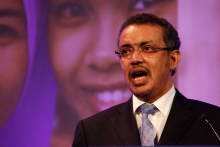All roads lead to Universal Health Coverage

This renewed commitment of WHO to relentless pursuit of health for all was made by Dr Tedros in The Lancet Global Health journal barely two weeks after he took up office. Stressing that universal access to health is a fundamental human right, he lamented the fact that 400 million people still lack access to essential healthcare and 40% of the global population do not have social protection.
Without losing sight of the key question of universal health coverage being an ethical one, he defined the issue well when he said:
"universal health coverage is ultimately a political choice. It is the responsibility of every country and national government to pursue it."
It is quite predictable that virtually all officials in every country would unequivocally say “no” in response to ethical questions such as: “Do we want our fellow citizens to die because they are poor? Or millions of families impoverished by catastrophic health expenditures because they lack financial risk protection?”
The formal consensus for making all necessary efforts for achieving universal health coverage, as stated in the Sustainable Development Goal 3.8, however, has to be backed with unequivocal support for public healthcare delivery. This requires rolling back the neoliberal consensus which promotes the primacy of profit through mechanisms such as Public-Private Partnerships (PPPs), Private Finance Initiatives (PFIs), contracting out of health services, free trade agreements, and mega-profits of big corporations, particularly in the insurance and pharmaceutical industries.
As the WHO Director-General notes, “universal health coverage includes not just healthcare but also health promotion and prevention and a broader public health approach.” In a world where 1 billion people live in poverty and have no access to drinking water, and 2.6 billion have no access to sanitation, it also includes taking decisive action in addressing the social determinants of health.
Trade unions and the broader civil society movement have to be relentless in advocacy to ensure that governments are fully implicated in the WHO’s many roads to universal health coverage. We have to mobilise around a popular agenda that puts people over profit, and send out a clear message that “our health is not for sale”.
The actuality of the human right to health is one we can and will win, but it goes hand in hand with the defeat of both the neoliberal paradigm as a model for development, and the dominance of its for-profit motive in the health sector. This is the road to a better future with public healthcare for all.

